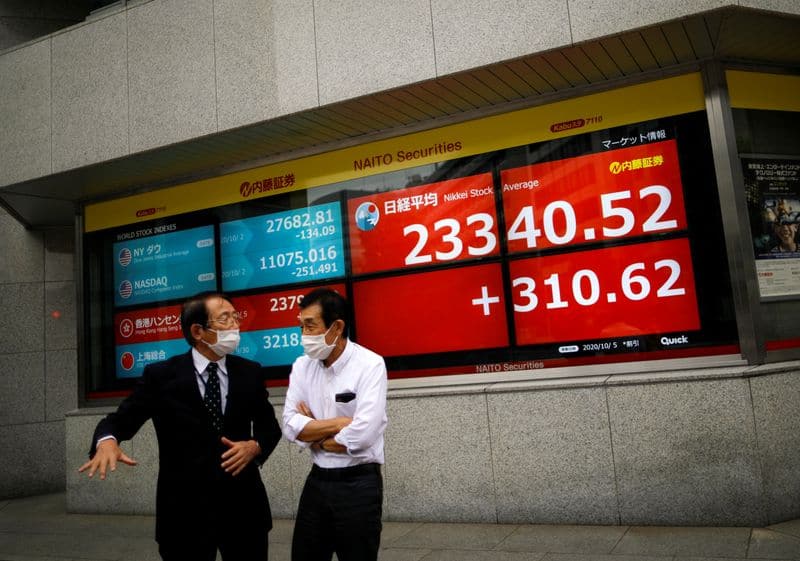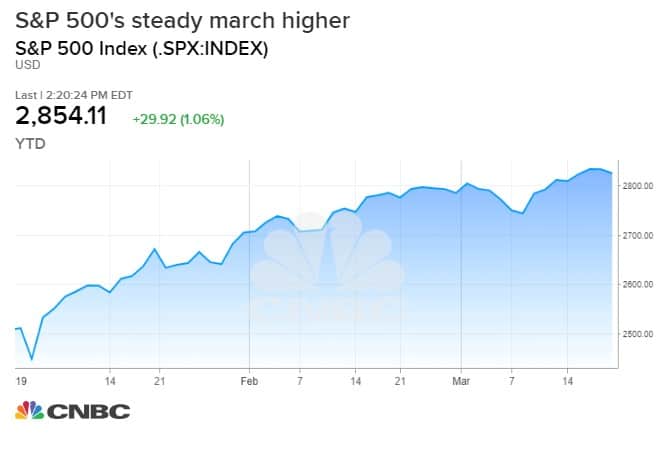
Asian shares bounced off one-month lows on Monday helped by Chinese factory activity expanding at its fastest pace in a decade, while oil prices skidded as many Western countries slid back into coronavirus-driven lockdowns.
A major risk event this week is the U.S. presidential elections on Tuesday with Republican President Donald Trump trailing Democratic challenger Joe Biden in national opinion polls.
Polls in the most competitive states that will decide the election have, however, shown a closer race, still favouring Biden.
MSCI’s broadest index of Asia-Pacific shares outside Japan (MIAPJ0000PUS) climbed 0.36%, as China’s Caixin/Markit Manufacturing Purchasing Managers’ Index offered hope the region’s success in containing the coronavirus could spare it the economic pain being inflicted on Europe and the United States.
The mood in Europe was downbeat with many countries in the region battling new COVID-19 infections and slipping back into virus lockdowns.
In early European trades, pan-region Euro Stoxx 50 futures (STXEc1) were down 0.1%, German DAX futures (FDXc1) were flat and London’s FTSE futures (FFIc1) were off 0.4%.
In Asia, on the other hand, all major indexes except New Zealand were up on Monday.
Australian shares (AXJO) rose 0.4%.
Chinese shares were higher with the blue-chip CSI300 (CSI300) rising 0.3% with the country’s vast industrial sector steadily returning to levels seen before the COVID-19 pandemic paralysed huge swathes of the economy.
Japan’s Nikkei (N225) jumped 1.4%.
E-Mini futures for the S&P 500 (ESc1) added 0.2%, with investor focus turning to the U.S. presidential elections on Tuesday.
Fresh coronavirus-induced lockdowns in Europe and parts of the United States have raised concerns over the outlook for fuel consumption, sending Brent crude (LCOC1) to a low of $35.74 per barrel, a level not seen since late May. U.S. crude went as low as $33.64. [O/R]
Global coronavirus cases surpassed 500,000 last week with Europe crossing the bleak milestone of 10 million total infections. The United Kingdom is grappling with more than 20,000 new cases a day while a record surge of U.S. cases is killing up to 1,000 people a day.
“Markets are looking ahead of Q4 and early 2021 where the growth outlook looks clouded given the move to stricter lockdowns in Europe,” Perpetual analysts wrote in a note.
They said a -1% hit to European growth would send global gross domestic product down by 0.5% over the subsequent 12 months.
“The key question here is how long are the lockdowns needed to get the virus under control.”
Underwhelming outlooks and results from some of Wall Street’s largest companies last week, including Apple (O:AAPL) and Facebook (O:FB), further soured the mood and dragged U.S. stocks lower last week. (N)
In currencies, the risk-sensitive Australian dollar slipped 0.4% to go below 70 U.S. cents for the first time since July. It was last at $0.7002.
The Japanese yen was slightly higher at 104.73 per dollar, while the British pound was last 0.3% lower at $1.2907. The euro (EUR=) slipped to $1.1635.
That left the dollar index, which measures the greenback against a basket of peers, barely changed at 94.12. (=USD)
A risk-on revival after the U.S. election could however see the dollar resume its slide from the March highs, analysts said.
JPMorgan (NYSE:JPM) analysts said the market likely views a Biden win as “short-term neutral” but “long-term negative” as his expected tax policy outweighs the benefits from a large stimulus package.
“SPX may have upside to ~3400, but it would have larger downside depending on the details of the package, potentially to ~2,500,” they added.
On Friday, the S&P 500 (SPX) lost 1.21% to close at 3,269.96. The Nasdaq Composite (IXIC) dropped 2.45% while the Dow (DJI) fell 0.6%.
























